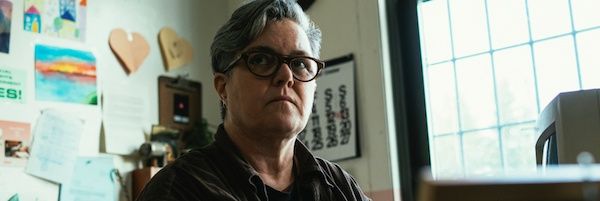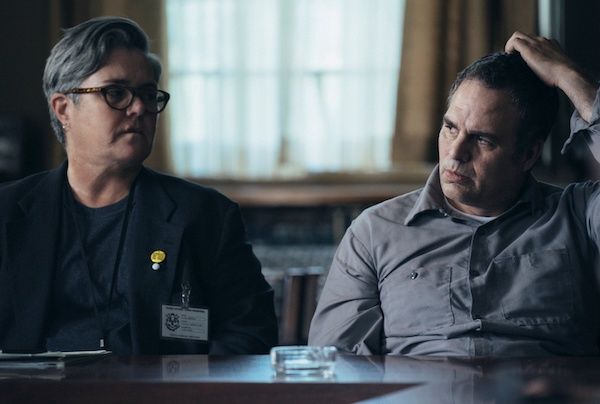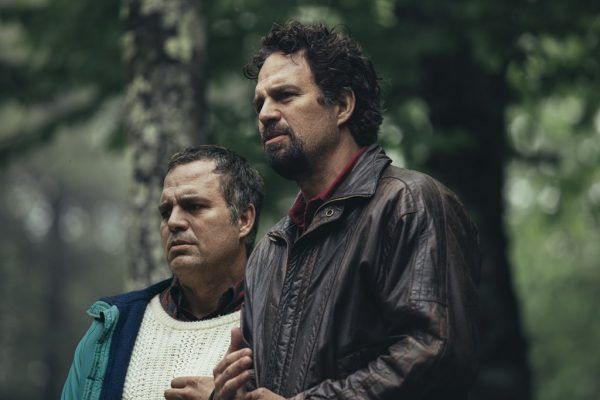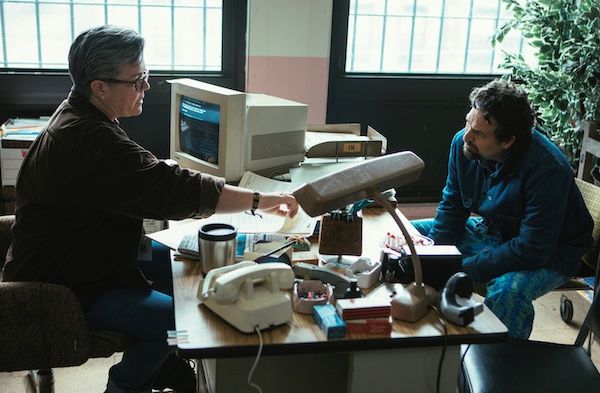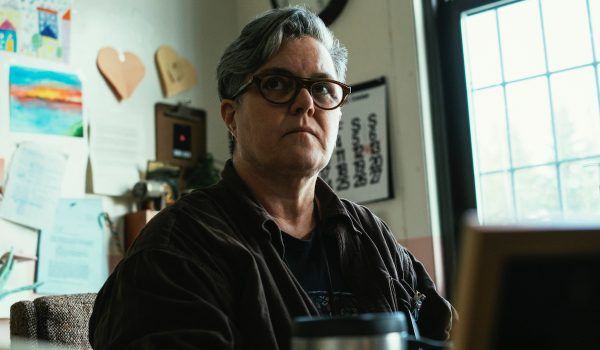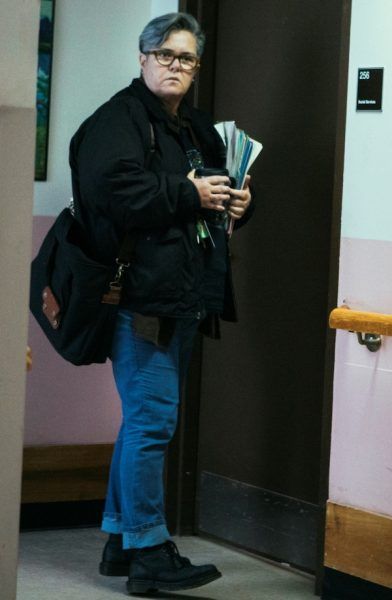From writer/director Derek Cianfrance and based on the award-winning novel of the same name by Wally Lamb, the six-part HBO limited series I Know This Much Is True follows identical twin brothers Dominick and Thomas Birdsey (played in two stand-out performances by Mark Ruffalo) on their own very different life paths. It’s a family saga of sacrifice and forgiveness which begins in their present — the early 1990s — and digs into different stages in their lives as it highlights how mental illness affects everyone, including the person directly dealing with it.
Rosie O’Donnell, who plays social worker Lisa Sheffer, spoke to Collider in a 1-on-1 phone interview during the virtual press day for the limited series. In the chat, we spoke about her call to meet with Cianfrance for this project, how her work on SMILF led to this role, what inspired her performance, the most challenging day on set, and much more.
COLLIDER: How did this come your way? Was this something where you just got one script to read, or did you get all of the scripts?
ROSIE O’DONNELL: I didn’t get any of the scripts, actually. It was a very interesting process. I got a call from my agent that there was a call for me to go meet with a director, Derek [Cianfrance], about this project. I was familiar with the book, but I didn’t know how he got to me, or knew what I was capable of. So, I went to meet with him. It was a two-hour meeting in an office, and we didn’t talk about the script really, at all. The only thing he said, related to the script, was to ask whether I would be willing to cut my hair very short. And I said, “Of course, I would.” Then, it turned out Mark Ruffalo’s wife, [Sunrise Coigney], had seen me in SMILF and recommended me for this role. That’s how I got in to see the director, and then got the part.
At what point, along the way, did you actually get scripts to read and find out more about this character?
O’DONNELL: I knew who the character was from reading the book. I also had a teacher in junior high school who took me under her wing after my mother died and became a mom to me. She left teaching and became a social worker towards the end of her career, so I was familiar with social workers, what they did, what it entailed, and how much emotional output it required to be in that profession.
I didn’t really get the scripts. We got them, one at a time, as we were doing them. That was scary to me because I had never had so much dialogue. I had never done pages and pages. The first day was a 12-page scene with Mark alone, and it was very scary and overwhelming. I remember saying in the first few minutes, “Line?” And Derek said, “What’d you say?” I said, “I forgot the line.” And he was like, “No, if you forget it, just keep going. Just make something similar up, and I know you’ll get there. You’ll go around, and you’ll get there.” So, that’s what we did. He allowed improvisation, in a way that was very freeing for me, and for Mark, as well.
We get to learn about all of these other characters through their relationships to both of these men, Dominick and Thomas Birdsey, and a lot of that is through scenes between just two actors having a conversation. As an actor, is there a joy in getting to explore the quiet and emotional moments like that?
O’DONNELL: Yeah, and Derek encouraged us to take every moment of reality that we could from it. He said, “As long as it’s authentic, I don’t care what you do. As long as you can justify what you’re doing and why you’re doing it, and as long as you can be real, constantly, then I’m golden.” So, that’s what we did. We followed his lead. He’s the best director I’ve ever worked with. I love working with him. I think he’s an absolute genius, the way he sees the movie in his head and knows how to do the double scenes with Mark. I found his filmmaking and ability to be extraordinary, and I loved working with him. You can see his voice, his aesthetic, and the way he lives his life, as you watch this film. Everything is up for discussion and exploration. He lives a very honest, truthful life, and I think that comes through in the film.
Was there a lot of discussion, as actors, as you did each scene, or did you get into a rhythm where you didn’t really need to have those conversations anymore?
O’DONNELL: In fact, we never really had the conversation, except that first day when he told me, “Be free, and be real.” That’s all he ever had to say, on that first day, and everyone seemed to follow his guidance. He has such a presence, and he’s yet so unassuming and kind of shy. He’s so connected to people and to relationships. Everyone on the film had worked with him before, besides me. The crew would tell me what they’d worked on with him before. All of the films that he’s done, he kept the people that he was friendly with, throughout. I can imagine having a long friendship with them. I really love him. He’s a very great guy.
It says a lot about a filmmaker, when people keep coming back like that, project after project.
O’DONNELL: Yeah. And it’s not just the actors. The hair and make-up guys have been with him for all of his movies. The craft service people have been there. Everyone was a part of his family, in some way. It created a really beautiful environment to work through such heavy material.
When you’re doing such heavy material, how does that affect the atmosphere on set? Was it a relaxed vibe because everyone was so familiar with each other, or does the heavy material make it feel more weighted?
O’DONNELL: It was a little of both. He’s so friendly and chatty. While they were changing the film, he’d sit down next to you and just chat. There was a very casual and family feel there, but the material was definitely a mountain, in terms of emotions. There was so much that was required of each actor in this. I only really worked with Mark. That’s it, except for one quick little scene with everyone. But it was heavy, and we knew it was heavy. It was heavy because we were in a mental institution that had been used for many, many years, and then closed down and abandoned. That’s where we shot, in an actual mental hospital. That was trippy and heavy and creepy. When were pulling in there, in the morning before the sun came up, it was pretty daunting, to say the least. But even though it was a very heavy film, it was a very beautiful atmosphere that was created by Derek. He created a whole family there, and that’s how it felt.
There’s something so beautifully pure about your character. She’s completely honest and makes it clear that she’s not really interested in taking shit from people, but she’s also so compassionate. Was that something that you had wanted to bring to the character, or was that on the page?
O’DONNELL: I think I brought that from that teacher who became a social worker. She was so loving and so compassionate, and she cared about everyone, but she didn’t suffer fools, in any way. She just found what she wanted and gave what she asked for. She required a level of honesty and commitment that she was willing to give, as well. The scenes with Mark felt like a great ping-pong game that you would watch in the Olympics and think, “How were they able to hit that ball?” That’s what it felt like, doing those scenes with Mark, which was really a privilege for me, acting wise, and a challenge. They made it so easy to fit right in there. Somebody who spends their life trying to help mentally ill people has to have a lot of compassion.
It certainly takes a very specific kind of person to be able to do a job like that. Why do you think this woman was someone who really just cared so deeply about people, and also found herself drawn to this guy, in particular?
O’DONNELL: There was part of it that I don’t think made the final cut, where Dominick says to Lisa, “Why do you care so much?” And she says, “Well, you’re not the only person in the world who has a mentally ill family member.” So, I think that her mother, her father, somebody in her life was mentally ill, and she grew up within that environment and knows how to move and live within it. I think she cares so much about Thomas and Dominick because she met Thomas and could see that he was a very, very sick man with his hand cut off, and then the next day, she met the brother and he looked just like him, and it throws her. I don’t think she ever had clients who were twins, and I don’t think she ever had a family member, who was so invested in helping their brother. By the time people get to be locked up for their mental illness, family members are usually really worn out and weary, and they don’t still have that drive to fight for them, but he did, and that was different about him, which drew her in.
Was there a most challenging day or scene, on this shoot?
O’DONNELL: The day of the funeral was really challenging. It was raining outside. It was wet, it was gray, and it was dreary. The house that we were filming in was very, very small. And Derek is all for authenticity, so he’d never remove a wall. We did it in an actual house. That was a tough day and it was also so full of grief. That scene that we were shooting was "Grief 101." You show up with all of your feelings, all of your regrets, and all of your wishes that didn’t come through, and we shot that scene, where everyone was going through that, at the same time. So, that was the hardest day for me.
You went from doing SMILF to doing this, which was very different in tone. Was that something about that which was very intentional? After doing something that leaned more towards comedy, did you want to follow that up with something more heavy and dramatic?
O’DONNELL: Well, I also felt that when I got to my 60s, I would get offered the heavy dramatic roles, like Geraldine Page or Colleen Dewhurst, or somebody like that, who really had formative years of their career in their senior stage. I’m 58 years old now, and I thought by the time that I was 60, I would be getting those offers. The fact that SMILF was dramatic as well as comedic really got me in here.
At this point in your life and career, are there things that you still want to do that you feel you haven’t done, as far as genres, or types of roles, or even maybe a specific person from history or some sort of source material, that you’d really love the chance to get to explore?
O’DONNELL: Well, I just love to be cast in dramatic roles, where it’s not just the funny best friend coming in with the quick quip. I love that I was able to do this role, which was dramatic without really any comedy in it. It really was exciting for me to be able to do that. I’m open to whatever comes. I’m hoping that more roles like this are coming my way, but you never know, in show biz in Hollywood. One day you’re cast as one thing, and the next day, it’s something else.
You’ve certainly had a varied career. Have your feelings about the work changed, over the years? Are there different things that get you excited about it now?
O’DONNELL: It’s really about what you’re seen as, in order to be cast in something. For a long time, I was typecast as the funny friend, which I’m not complaining about. That’s what gave me my entire career. But there are not a lot of deep dramatic roles for women in their 30s and 40s, that don’t go to the starlets. All of those roles usually go to the gorgeous women that society uses in all of their films. I was just so happy and lucky to get a dramatic role. I would love to do any kind of dramatic role. When I see films with someone in a role that I could have played, I always call my agent and go, “By the way, didn’t I get to read that? Why didn’t I get an interview for that?” But as things grow and as your experiences build up in your career, I’ve done a lot of different things. I’m very lucky that I’ve continued to work since I was in my 20s, and I’m now almost 60. That’s hard for me to believe. It’s hard to even say, but it’s true. I’m 58 years old, and I’ve been very fortunate to have the career that I’ve had and to get to work with the people that I did. All of it builds up to whatever is coming next.
The I Know This Much Is True series finale airs Sunday, June 14, on HBO at 9/8c.

